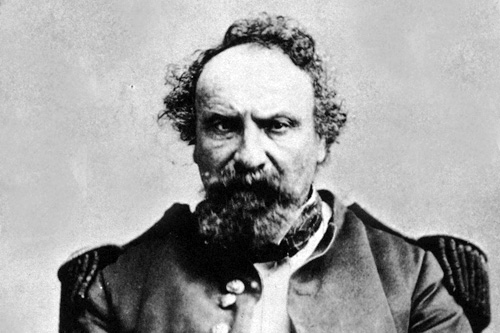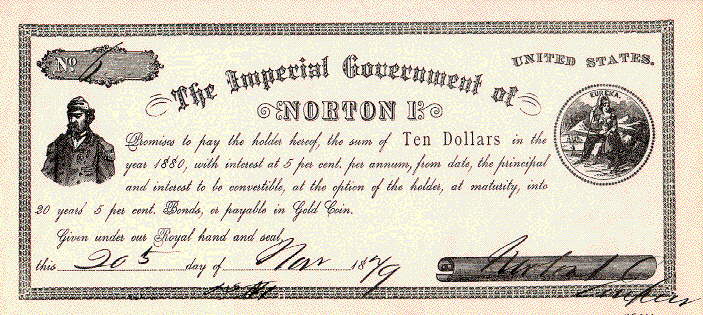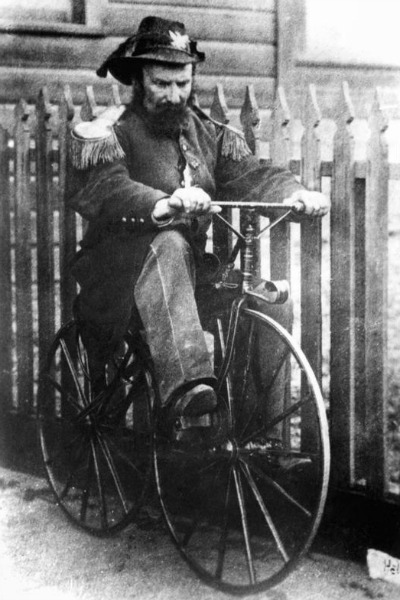It would seem from today’s unusual wikipedia article that the british don’t have a monopoly on whimsy…
Joshua Abraham Norton (c. 1819 – January 8, 1880), the self-proclaimed Imperial Majesty Emperor Norton I, was a celebrated citizen of San Francisco, California, who in 1859 proclaimed himself “Emperor of these United States” and subsequently “Protector of Mexico”.
Born in England, Norton spent most of his early life in South Africa. He immigrated to San Francisco in 1849 after receiving a bequest of $40,000 from his father’s estate, arriving aboard the steam yacht Hurlothrumbo. Norton initially made a living as a businessman, but he lost his fortune investing in Peruvian rice.
After losing a lawsuit in which he tried to void his rice contract, Norton left San Francisco. When Norton returned from his self-imposed exile, he had become completely disgruntled with what he considered the inadequacies of the legal and political structures of the United States. On September 17, 1859, he took matters into his own hands and distributed letters to the various newspapers in the city, proclaiming himself “Emperor of these United States”:
At the peremptory request and desire of a large majority of the citizens of these United States, I, Joshua Norton, formerly of Algoa Bay, Cape of Good Hope, and now for the last 9 years and 10 months past of S. F., Cal., declare and proclaim myself Emperor of these U.S.; and in virtue of the authority thereby in me vested, do hereby order and direct the representatives of the different States of the Union to assemble in Musical Hall, of this city, on the 1st day of Feb. next, then and there to make such alterations in the existing laws of the Union as may ameliorate the evils under which the country is labouring, and thereby cause confidence to exist, both at home and abroad, in our stability and integrity.
—NORTON I, Emperor of the United States.
The announcement was first reprinted for humorous effect by the editor of the San Francisco Bulletin. Norton would later add “Protector of Mexico” to this title. Thus commenced his unprecedented and whimsical 21-year reign over America.
Norton spent his days issuing decrees to the government and inspecting San Francisco’s streets in an elaborate blue uniform with gold-plated epaulettes, given to him by officers of the United States Army. He also wore a beaver hat decorated with a peacock feather and a rosette. He frequently enhanced this regal posture with a cane or umbrella. During his inspections, Norton would examine the condition of the sidewalks and cable cars, the state of repair of public property, and the appearance of police officers. Norton would also frequently give lengthy philosophical expositions on a variety of topics to anyone within earshot.
Norton was loved and revered by the citizens of San Francisco. Although penniless, he regularly ate at the finest restaurants in San Francisco; restaurateurs took it upon themselves to add brass plaques in their entrances declaring “By Appointment to his Imperial Majesty, Emperor Norton I of the United States.” Norton’s self-penned Imperial seals of approval were prized and a substantial boost to trade. No play or musical performance in San Francisco would dare to open without reserving balcony seats for Norton.
Norton also issued his own money to pay for his debts, and it became an accepted local currency in San Francisco. These notes came in denominations between fifty cents and ten dollars; the few surviving notes are collector’s items. The city of San Francisco also honoured Norton. When his uniform began to look shabby, the San Francisco Board of Supervisors bought him a suitably regal replacement.
In 1867, a policeman named Armand Barbier arrested Norton to commit him toinvoluntary treatment for a mental disorder. The Emperor’s arrest outraged the citizens and sparked scathing editorials in the newspapers. Police Chief Patrick Crowley ordered Norton released and issued a formal apology on behalf of the police force. Crowley wrote “that he had shed no blood; robbed no one; and despoiled no country; which is more than can be said of his fellows in that line.” Norton magnanimously granted what he considered an Imperial Pardon to the errant policeman. All police officers of San Francisco thereafter saluted Norton as he passed in the street.
During the later years of Norton’s reign, he was the subject of considerable speculation. One popular story suggested he was the son of Emperor Napoleon III, and that his claim of coming from South Africa was a ruse to prevent persecution. Another popular story suggested Norton was planning to marry Queen Victoria. While this claim is unsupported, Norton did write to the Queen on several occasions, and he is reported to have met Emperor Pedro II of Brazil. Rumours also circulated that Norton was supremely wealthy—only affecting poverty because he was miserly.
On the evening of January 8, 1880, Norton collapsed on a street corner while on his way to a lecture. Norton died before a carriage could arrive. The following day the San Francisco Chronicle published his obituary on its front page under the headline “Le Roi est Mort” (“The King is Dead”). In a tone tinged with sadness, the article respectfully reported that, “On the reeking pavement, in the darkness of a moon-less night under the dripping rain…, Norton I, by the grace of God, Emperor of the United States and Protector of Mexico, departed this life”.
It quickly became evident that, contrary to the rumours, Norton had died in complete poverty. Norton’s funeral on Sunday, January 10, was solemn, mournful, and large. Some accounts say as many as 30,000 people lined the streets, and that the funeral cortège was two miles long.
Although details of his life story may have been forgotten, Emperor Norton was immortalized in literature. Mark Twain, who resided in San Francisco during part of Emperor Norton’s period of assumed Emperorship, modelled the character of the King in Adventures of Huckleberry Finn on Joshua Norton.
Robert Louis Stevenson made Norton a character in his 1892 novel, The Wrecker. Stevenson’s stepdaughter, Isobel Osbourne, mentioned Norton in her autobiography, This Life I’ve Loved. She said that Norton “was a gentle and kindly man, and fortunately found himself in the friendliest and most sentimental city in the world, the idea being ‘let him be emperor if he wants to.’ San Francisco played the game with him.”














Very J Peasmold Gruntfuttock, self proclaimed monarch and dictator of Peasmoldia, a small slum area in north London just off the Balls Pond Road.
Incidentally, HRH Gruntfuttock was the secretary and sole member of the Judith Chalmers fan club (Balls Pond Road branch).
The Dauphin in The Adventures of Huckleberry Finn, whom I do not recall mostly styling himself King, was like the Duke a clear-eyed grifter, with no delusions about the stories he was telling. Both Duke and Dauphin had claims in Europe, and I think that their only US claims amounted to the beds on the raft.
Twain was definitely interested in Emperor Norton, here he is discussing him in a letter:
Oh, dear, it was always a painful thing to me to see the Emperor (Norton I., of San Francisco) begging; for although nobody else believed he was an Emperor, he believed it. … What an odd thing it is, that neither Frank Soulé, nor Charley Warren Stoddard, nor I, nor Bret Harte the Immortal Bilk, nor any other professionally literary person of S.F., has ever “written up” the Emperor Norton. Nobody has ever written him up who was able to see any but his (ludicrous or his) grotesque side; but I think that with all his dirt & unsavoriness there was a pathetic side to him. Anybody who said so in print would be laughed at in S.F., doubtless, but no matter, I have seen the Emperor when his dignity was wounded; and when he was both hurt & indignant at the dishonoring of an imperial draft; & when he was full of trouble & bodings on account of the presence of the Russian fleet, he connecting it with his refusal to ally himself with the Romanoffs by marriage, & believing these ships were come to take advantage of his entanglements with Peru & Bolivia; I have seen him in all his various moods & tenses, & there was always more room for pity than laughter. He believed he was a natural son of one of the English Georges–but I wander from my subject.
– letter to William Dean Howells, September 3, 1880
If I remember correctly Neil Gaiman, a very boring comics writer who now appears in The Guardian every other day, wrote a Sandman comic about this chap in the early 1990s.
Ah! I thought I had somehow heard of him before, thanks Daniel! (I rather liked the Sandman comics when they came out)
They were OK, though not as awesome as Norman Mailer et al pretended, but that particular issue was very good as I recall.
I visited Norton’s grave in Colma (where most of San Francisco’s cemeteries were relocated to in the early C20th) last year. Wandering around Woodlawn Memorial Park, I felt like I’d stepped into the pages of The Loved One. The Empress Norton (aka Jose Sarria, gay rights activist and drag queen) has just recently been interred near to Norton’s unassuming headstone.
A quick word from the Continent (the landmass sometimes cut of from the UK by fog or the bureaucrats in Brussels):
The story of Norton is probably best known from the Lucky Luke album Emperor Smith by Goscinny & Morris. It captures well the kind atmosphere at a time when buffaloes and not therapist uses to roam free in North America.